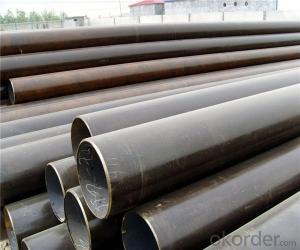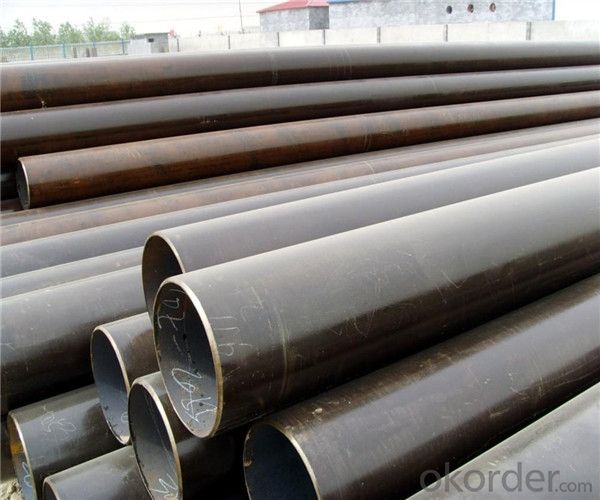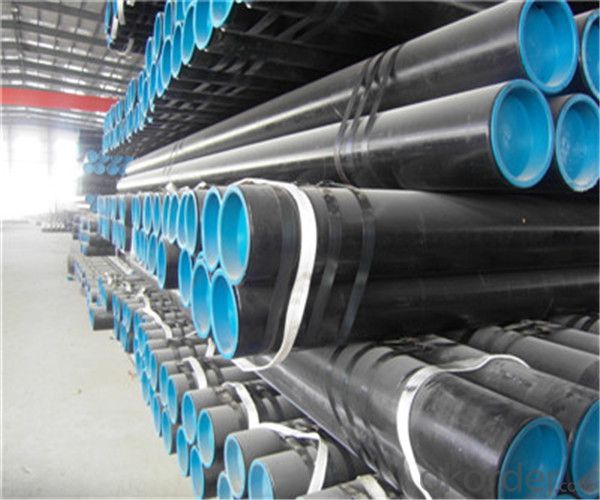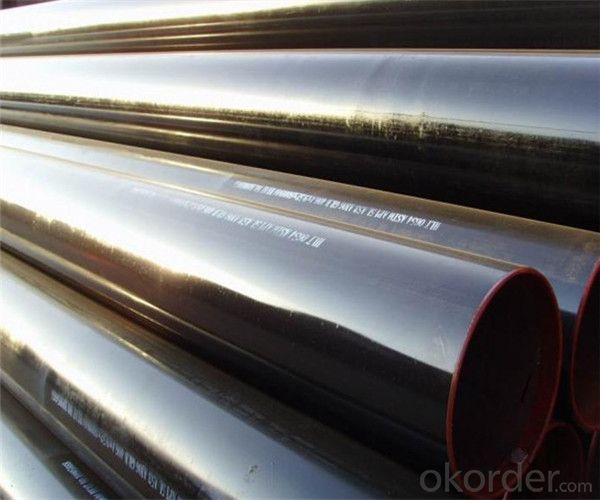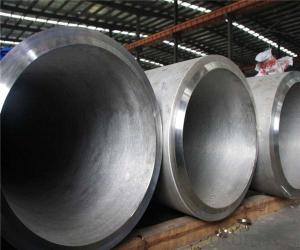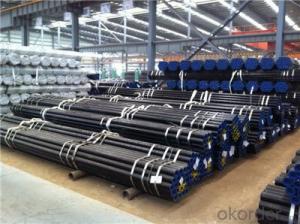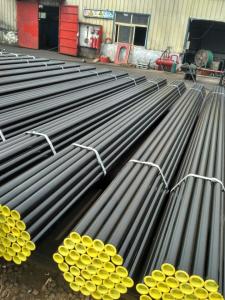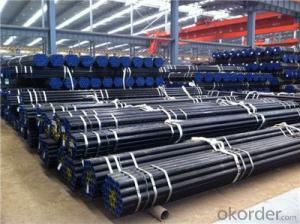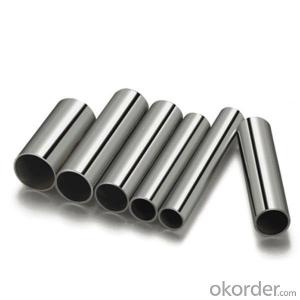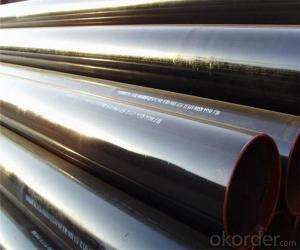High Quality Seamless Steel Pipe with Best Price from CNBM
- Loading Port:
- Tianjin
- Payment Terms:
- TT OR LC
- Min Order Qty:
- 100 m.t.
- Supply Capability:
- 200000 m.t./month
OKorder Service Pledge
OKorder Financial Service
You Might Also Like
PRODUCT DETAILS
1.Structure of Seamless Steel Pipe Description:
A large amount of Seamless Steel Pipes is offered to the clients at cost effective rates. These pipes are extremely durable, resistant to corrosion and have high tensile strength. Our pipes are used in nuclear plants, power plants, refineries and construction industry across the country. Furthermore, we are capable of providing these seamless pipes to the clients in bulk quantity.
2.Main Features of the Steel Pipe:
• High manufacturing accuracy
• High strength
• Small inertia resistance
• Strong heat dissipation ability
• Good visual effect
•Reasonable price
3.Seamless Steel Pipe Specification:
| Standard: | GB, DIN, ASTM,ASME, ASTM A106-2006, ASTM A53-2007 |
| Grade: | 10#,20#, 45#, 16Mn |
Thickness: | 8 - 33 mm |
| Section Shape: | Round |
| Outer Diameter: | 133 - 219 mm |
| Place of Origin: | Shandong, China (Mainland) |
| Secondary Or Not: | Non-secondary |
| Application: | Hydraulic Pipe |
| Technique: | Cold Drawn |
| Certification: | API |
| Surface Treatment: | factory state or painted black |
| Special Pipe: | API Pipe |
| Alloy Or Not: | Non-alloy |
| Length: | 5-12M |
| Outer Diameter: | 21.3-610mm |
| Packaging Details: | Seaworthy packages, bundles wrapped with strong steel strip |
| Delivery Detail: | 15-30 days after received 30% TT |
4.Product pictures
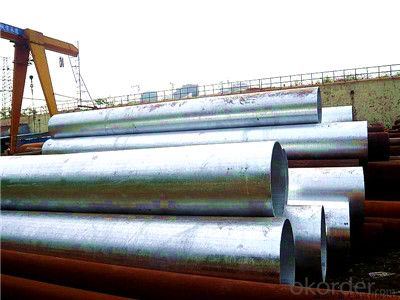
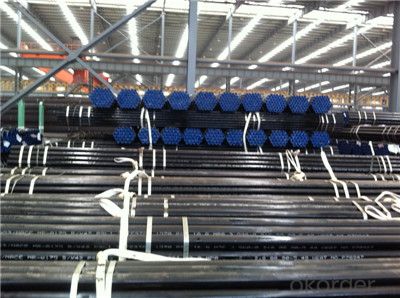
5.FAQ of Seamless steel pipe:
①How is the quality of your products?
Our products are manufactured strictly according to national and internaional standard, and we take a test
on every pipe before delivered out. If you want see our quality certifications and all kinds of testing report, please just ask us for it.
Guaranteed: If products’ quality don’t accord to discription as we give or the promise before you place order, we promise 100% refund.
②How about price?
Yes, we are factory and be able to give you lowest price below market one, and we have a policy that “ for saving time and absolutely honest business attitude, we quote as lowest as possible for any customer, and discount can be given according to quantity”,if you like bargain and factory price is not low enough as you think, just don’t waste your time.Please trust the quotation we would give you, it is professional one.
③Why should you chose us?
Chose happens because of quality, then price, We can give you both.Additionally, we can also offer professional products inquiry, products knowledge train(for agents), smooth goods delivery, exellent customer solution proposals.Our service formula: good quality+good price+good service=customer’s trust.
SGS test is available, customer inspection before shipping is welcome, third party inspection is no problem.
Any question, pls feel free to contact us !
- Q: How are steel pipes insulated for thermal applications?
- Steel pipes are commonly insulated for thermal applications using various materials such as fiberglass, mineral wool, or foam insulation. These insulating materials are typically wrapped around the steel pipes to create a protective barrier that reduces heat transfer. Additionally, a vapor barrier may be installed to prevent moisture condensation. This insulation helps to maintain the desired temperature of the fluid or gas being transported through the pipes and prevents energy loss.
- Q: Can steel pipes be used for marine applications?
- Yes, steel pipes can be used for marine applications. Steel pipes have excellent strength and corrosion resistance, making them suitable for various marine environments. They are commonly used in shipbuilding, offshore structures, and underwater pipelines due to their durability and ability to withstand harsh conditions in saltwater.
- Q: How are steel pipes graded?
- Steel pipes are graded based on several factors to determine their quality and suitability for specific applications. The grading system for steel pipes typically includes parameters such as the chemical composition, mechanical properties, manufacturing method, and testing standards. 1. Chemical composition: Steel pipes are graded based on the elements present in their composition. This includes the amount of carbon, manganese, phosphorus, sulfur, and other alloying elements. The chemical composition greatly influences the pipe's strength, corrosion resistance, and other properties. 2. Mechanical properties: The mechanical properties of steel pipes are crucial for determining their strength, flexibility, and resistance to pressure and temperature. These properties include tensile strength, yield strength, elongation, hardness, and impact toughness. Pipes with higher mechanical properties are generally graded higher. 3. Manufacturing method: Steel pipes can be manufactured using various methods, such as seamless, welded, or ERW (Electric Resistance Welding). The manufacturing method affects the pipe's integrity, dimensional accuracy, and overall quality. Seamless pipes, for example, are considered to have higher quality due to their uniformity and absence of weld seams. 4. Testing standards: Steel pipes are graded based on their adherence to specific testing standards. These standards ensure that the pipes meet the required quality criteria and are suitable for their intended applications. Common testing standards include ASTM (American Society for Testing and Materials), API (American Petroleum Institute), and EN (European Norms). Based on these factors, steel pipes are often graded using alphanumeric codes or specifications. For instance, pipes used in oil and gas industry may be graded as API 5L (American Petroleum Institute) or pipes used for structural purposes may be graded as ASTM A500 (American Society for Testing and Materials). In conclusion, steel pipes are graded based on their chemical composition, mechanical properties, manufacturing method, and adherence to testing standards. These grades help customers and manufacturers in selecting the appropriate pipes for specific applications, ensuring safety, durability, and efficiency in various industries.
- Q: How are steel pipes used in the manufacturing of structural frameworks?
- Steel pipes are commonly used in the manufacturing of structural frameworks due to their strength, durability, and versatility. They provide a reliable means of connecting and supporting various components, allowing for the creation of robust and stable structures. Steel pipes are often used as columns, beams, and braces, providing essential support and stability to buildings, bridges, and other infrastructure projects. Additionally, steel pipes can be easily customized and fabricated to meet specific design requirements, making them a popular choice in the construction industry.
- Q: Can steel pipes be used for underground water supply networks?
- Steel pipes are a viable option for underground water supply networks; they possess qualities such as durability, strength, and corrosion resistance. These pipes are commonly employed due to their ability to endure high pressure and bear the weight of the soil and other external forces. Furthermore, steel pipes come in a range of sizes and can be easily welded, making them suitable for diverse water supply system needs. Nevertheless, it is crucial to consider factors like soil quality, the presence of corrosive substances or chemicals, and the necessity of routine maintenance to guarantee the long-lasting effectiveness of steel pipes in underground water supply networks.
- Q: What is the difference between steel pipes and fiberglass pipes?
- Steel pipes and fiberglass pipes differ in their material composition and properties. Steel pipes are made of iron and carbon alloy, making them strong and durable. They are suitable for high-pressure applications and can withstand extreme temperatures. In contrast, fiberglass pipes are composed of glass fibers embedded in a resin matrix. They are lightweight, corrosion-resistant, and have excellent thermal insulation properties. Fiberglass pipes are commonly used in industries where corrosion or chemical resistance is required, and they are also more cost-effective for certain applications.
- Q: What is the outer diameter and wall thickness of DN40 steel pipe?
- DN40 pipe diameter 48.3mm diameter, allowable deviation of plus or minus 0.5mm it depends on what you have, the outside diameter of 45, there are other dimensions, you can see the manual
- Q: How long do steel pipes last?
- There are several factors that can influence the lifespan of steel pipes. These factors include the quality of the steel used, the installation environment, and the maintenance and care provided to the pipes. Steel pipes are generally recognized for their durability and long life. When properly installed and regularly maintained, steel pipes can endure for many decades, sometimes even surpassing 50 years. However, it is important to consider external factors that can greatly impact their lifespan, such as corrosion, exposure to extreme temperatures, and chemical reactions. To ensure the reliability and functionality of steel pipes for an extended period, it is crucial to conduct regular inspections, make timely repairs, and apply protective coatings.
- Q: There are multiple welded galvanized steel pipe outer diameter 108mm wall thickness 4mm length of 6 meters
- Formula for calculating weight of welded steel pipe:Kg/m= (outside diameter mm-, wall thickness mm) * wall thickness mm*0.02466= (108-4) *4*0.02466=10.26 kg / MBecause of galvanizing, the weight is heavier than that of ordinary welded pipe 3%~6%.Therefore, the length of 6 meters galvanized steel pipe weighs about 10.26*6*1.06=65 kilograms
- Q: Is there any difference between HFW steel pipe and ERW steel pipe?
- Resistance welding, as the name suggests, resistance welding is a method of welding by welding electrode after exerting pressure on electrode and utilizing electric current through the contact surface of connector and adjacent zone. High frequency welding: high frequency current through the metal conductor, will produce two kinds of peculiar effects: skin and proximity effects, high frequency welding is the use of these two kinds of effects of steel pipe welding, the effects of the two is based on the high frequency welding metal.
Send your message to us
High Quality Seamless Steel Pipe with Best Price from CNBM
- Loading Port:
- Tianjin
- Payment Terms:
- TT OR LC
- Min Order Qty:
- 100 m.t.
- Supply Capability:
- 200000 m.t./month
OKorder Service Pledge
OKorder Financial Service
Similar products
Hot products
Hot Searches
Related keywords
